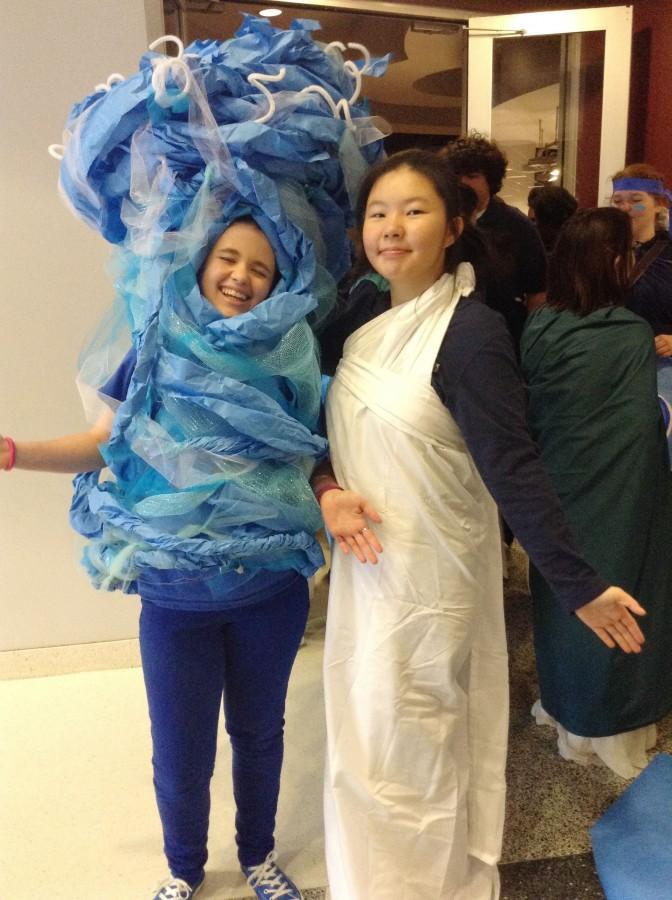10 Reasons to Take Latin at MSMS
aurel Lancaster dressed as Charybdis and Jenny Huang in a toga at Latin Convention
March 7, 2016
If there was one thing that convinced me to take Latin at MSMS, besides Mrs. Pierce’s impressive array of languages, or Mrs. Pierce’s laid-back Latin class atmosphere, it was the prospect of chariot races.
Although MSMS is a math and science school, you haven’t experienced super-nerdiness of MSMS until you’ve seen Latin students prepare for Latin Convention. They will scramble around the dorm rooms, searching for spare bedsheets to wrap themselves in togas. They will study tables of grammar charts or ancient mythology family trees to prepare for academic tests. They will buy chicken wire and tulle to make an outrageous costume of a tentacled sea monster or a deadly whirlpool. And finally, they will drill, paint, cut, glue and stick anything and everything to make a functioning, rideable chariot. All within a week (because MSMS is also a school of procrastinators).
You may think Latin is a dead language; but, at MSMS, Latin is alive and kicking. Though I could have taken Spanish and finished my language requirements earlier, I chose to take Latin, and I’m not entirely sure why. I think I wanted to learn something new that my old school didn’t have. Or it just sounded cool. Nevertheless, I remember my friends telling me that it wasn’t worth it, that I wouldn’t learn anything useful. On the contrary, I’m so glad I took Latin at MSMS. Here are a few reasons, based on my experience, on why you should consider taking Latin at MSMS.
- You will appreciate English.
After learning Latin’s complicated grammar structure, with each root word having endings to designate between the subject, object of the preposition, direct object, or indirect object of a sentence, you will be glad that English isn’t this complicated. To me, translating sentences from Latin to English is like a puzzle, and it’s satisfying to piece all the words together in a coherent sentence. - You will gain a better understanding of grammar and word structure.
Why does word order matter? What’s the difference between “have been” or “had been”? These are just a few of questions you’ll answer by learning Latin grammar, and I believe it enhances your writing skills. - You will understand the roots and meanings of words you’ve used your entire life.
Fun Fact: The word “invent” comes from the Latin word “venire” which means “to come” or “to come upon.” Does it make sense? Isn’t it cool? (If you’re interested in more Latin roots, check out this link!) - You will make new friends.
You and your fellow Latin students will struggle with conjugations and declensions starting from day one. You will hate the grammar, but you’ll hate it together. - It’s a pretty chill class.
Especially after filling your mind with equations, formulas, and science things, a dose of good ol’ fashioned grammar and words really refreshes the mind. - You will learn about mythology (and Roman history).
Were you ever a Percy Jackson fan? Do you ever wonder where the names of the planets come from? In Latin, we translate passages about Roman life or mythology stories from Latin to English. Other days, we just discuss Roman culture or mythology with a powerpoint or a video (and no grammar!) - You get to play spoons.
One of our favorite games is to play spoons, but instead of trying to get all four face cards of one symbol, you try to get all four principal parts of a Latin verb. It gets wild. - Latin Convention!
You get to miss a day of school with your fellow Latin students, geeking out about classics. To read more about it, check out a previous article on the 2016 Latin Convention. - You get to build/ride/pull/race a chariot!
The math and engineering side of MSMS really shines when Latin students build the chariot. We won first place in the chariot race this year! - You get to hang out with Mrs. Pierce.
Who wouldn’t want to hang out with the amazing Mrs. Pierce for an hour on Monday, Wednesday, and Fridays?









